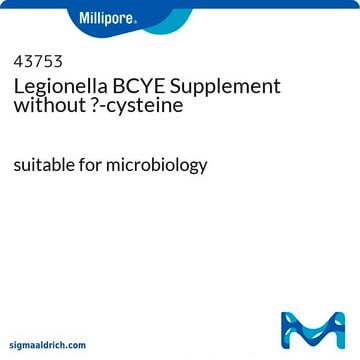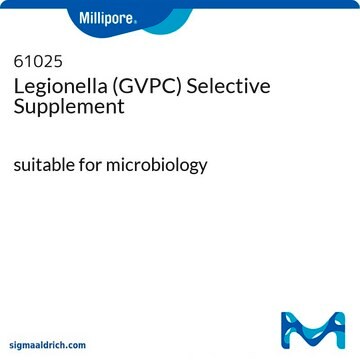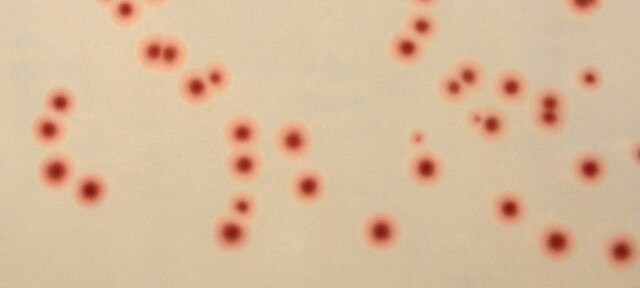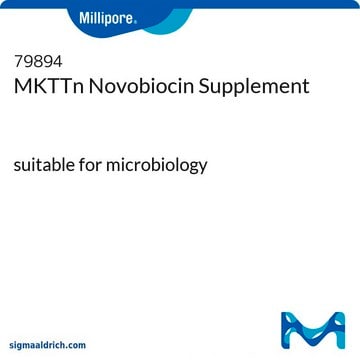0797
GVPC Agar

ready-to-use, plate of 20 × 23 ± 1 mL, selective for bacteria: Legionella spp
Iniciar sesiónpara Ver la Fijación de precios por contrato y de la organización
About This Item
UNSPSC Code:
41106217
Productos recomendados
agency
ISO 11731
form
plate (Semi-solid Media Filled)
feature
ready-to-use
packaging
plate of 20 × 23 ± 1 mL
technique(s)
microbiological culture: suitable
plate size
90 mm
pH
6.9 ± 0.2 (25 °C)
application(s)
food and beverages
water monitoring
storage temp.
2-8°C
suitability
selective for bacteria: Legionella spp
Categorías relacionadas
General description
GVPC Agar, also known as Glycine-vancomycin-polymyxin-cycloheximide agar, is a Ready-to-Use media designed as per ISO Standards 11731 to detect Legionella spp.
The activated carbon in GVPC agar has an antitoxic effect due to the adsorption of fatty acids, but especially due to the breakdown of oxygen radicals and H2O2. Yeast extract provides the necessary proteins and nutrients. L-cysteine is an essential growth factor for all Legionella. The soluble iron (III) pyrophosphate [Fe4(P2O7)3] is used as a special iron source, whose quality significantly affects the growth of the Legionella. α-ketoglutarate stimulates the growth of legionella both as a carbon and nitrogen source (Krebs Cycle) as well as through mediation of the iron transport, the high amount of glycine and polymyxin B act against gram-negative, Vancomycin act against gram-positive bacteria of the accompanying bacterial flora. Cycloheximide acts fungicidal against both yeasts and molds. Thus, the selectivity of the medium is increased.
The activated carbon in GVPC agar has an antitoxic effect due to the adsorption of fatty acids, but especially due to the breakdown of oxygen radicals and H2O2. Yeast extract provides the necessary proteins and nutrients. L-cysteine is an essential growth factor for all Legionella. The soluble iron (III) pyrophosphate [Fe4(P2O7)3] is used as a special iron source, whose quality significantly affects the growth of the Legionella. α-ketoglutarate stimulates the growth of legionella both as a carbon and nitrogen source (Krebs Cycle) as well as through mediation of the iron transport, the high amount of glycine and polymyxin B act against gram-negative, Vancomycin act against gram-positive bacteria of the accompanying bacterial flora. Cycloheximide acts fungicidal against both yeasts and molds. Thus, the selectivity of the medium is increased.
Application
Glycine Vancomycin Polymyxin Cycloheximide (GVPC) Agar is a selective culture medium used for the isolation, detection and enumeration of Legionella spp. in water samples from various sources (water intended for human consumption, wastewater, thermal and mineral waters, etc.) and food and beverage samples.
Certificados de análisis (COA)
Busque Certificados de análisis (COA) introduciendo el número de lote del producto. Los números de lote se encuentran en la etiqueta del producto después de las palabras «Lot» o «Batch»
¿Ya tiene este producto?
Encuentre la documentación para los productos que ha comprado recientemente en la Biblioteca de documentos.
Nuestro equipo de científicos tiene experiencia en todas las áreas de investigación: Ciencias de la vida, Ciencia de los materiales, Síntesis química, Cromatografía, Analítica y muchas otras.
Póngase en contacto con el Servicio técnico







